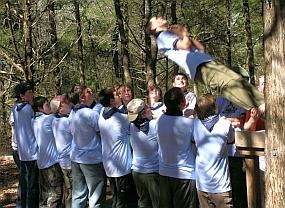A true story, with some parts tweaked to protect others…
When the economy cratered a few years back, resulting in an unforeseen layoff, Barry spent day after day looking for work. Turned it into a job like everyone said he should. But if Barry’s new job of looking for a job was any indication, he would have enjoyed a more lucrative career selling water on the moon.
Barry was a Christian, as was his wife, Karen, and their daughter, Krysta. None of them understood why God would make it so hard for a humble, talented man like Barry to support his family.
In time, the job hunt was supplemented with plenty of book-reading and music-listening. Barry fell in love with the bravura passages of little-known author Guy Ames. In fact, that admiration for Ames convinced Barry to try his own hand at writing a novel. He entitled it Unfinished Business.
After five years of unemployment, in which Barry did anything he could find to bring in money, he hit the motherload. A high school buddy he had not talked with in over 20 years called him out of the blue after Googling him. Jim, who owned a growing company, had just become a Christian, and after praying one night, felt compelled to ask what had happened to Barry. The Internet told Jim what he wanted to know, and he wanted the esoteric skills Barry had. In fact, he offered his old friend twice as much money as Barry had ever made.
But the job wouldn’t start for six weeks. Having been miserly for years, Barry decided to do something to celebrate. Guy Ames was speaking at a small writing conference in San Diego. Barry thought he’d kill a bunch of birds with one small stone, so he called the conference leaders and found that a few spaces still existed. Barry snapped up one, bought a plane ticket, reserved a hotel room, and worked up an elevator pitch for Unfinished Business.
When he announced that he was making this small personal pilgrimage, his wife was happy for him. She had a fear of flying, so she wasn’t interested in going, but Krysta read a brochure on the conference and saw one of her favorite authors was attending too. Soon, the trip was a dad and daughter thing. Given that Krysta was getting married in a few months, both she and her dad considered it one last dad-daughter event before another man became more important in her life.
The night before their departure, Krysta heard a voice. Over the past six months, she had increasingly heard what sounded like a voice, but this time the voice said something that sounded like real words: Don’t go on that trip. Krysta was terrified. The feeling of dread was so strong, she barely slept a wink all night in her apartment–except when she finally dropped off an hour before she was supposed to get up for her flight.
Barry forgot to call over to Krysta’s place just before he left, and when he arrived at the airport, he found he had also forgotten to charge his cell phone AND he left the charger back on the counter in the kitchen. Still, Krysta’s roommates, some of her old sorority sisters from college, were ultradependable, so Barry knew Krysta wouldn’t be too late because the girls wouldn’t allow it.
But when an elderly lady on standby looked like she was going to be bumped, Barry thought he’d be a gentleman and let her take his place. Krysta was obviously delayed, and catching the later flight made sense. Barry surrendered his seat. The airlines promised they’d move him up to first class, Krysta too.
Krysta never made it to the airport, though. She missed an exit, and ended up stuck in the aftermath gridlock caused by a semi rollover on the highway.
Barry wasn’t sure what was happening with Krysta, but hearing one of his favorite bands blaring from the headphones of the young man sitting next to him told he should get on that plane and let Krysta figure it out. She was a big girl and could fix her own problems.
Fly like an eagle, to the sea.
Fly like an eagle, let my spirit carry me.
Barry was going to see that band when he got back. He already had the tickets; a second gift, but this time one Karen would like too.
Just 12 minutes before it was to land, Barry’s plane took a lightning strike to an engine. Normally, the lightning arrestor worked fine, but it had been replaced and reattached incorrectly by a mechanic. At the inquest, it came out that the mechanic had been up late partying after attending a rock concert, one given by the band Barry would never live to hear. The engine caught fire, and the wing of the plane lost integrity. The plane went down just off the coast of California, all 113 aboard perishing.
In the aftermath, Krysta told her mother about the voice, and they both held each other for a long time, stunned. Krysta’s fiancé called it a miracle. Karen and Kyrsta didn’t feel that was the best choice of words. Still, when she spoke at her father’s memorial service, Krysta found herself using that word too.
Guy Ames had to cancel his appearance at the workshop due to a ruptured appendix. He later felt that brush with death was a wake-up call. Four months of healing later, he took his meager book earnings and launched a small software firm that Google bought, ensuring he never had to worry about money again. He never wrote anything else.
Just 11 days before her wedding, Krysta came down with what felt like the flu. At least that’s what the doctor told her. She stayed in bed to try to rest up, and that was where her roommates found her, dead. The autopsy showed a large, fast-growing brain tumor. She was 23.
One of Krysta’s roommates was so touched by what happened, the only way she could deal with it was through song. She and the other roommates formed a band and recorded the song. “Then She Was Gone” was a minor hit online, and the band Scarlet Queens, enjoyed the peculiarity of being an all-female death metal band, though they never made it big and folded a couple years later.
Life wasn’t good for the survivor. Like her daughter, Karen crawled into bed and stayed there. During her self-imposed beddedness, she could not keep her eyes off a pile of paper on Barry’s dresser. It was the manuscript for Unfinished Business–unfinished. Karen had never read one word of it.
On the 29th day of her exile, she took the manuscript down and spent the rest of the day lost in it. She admitted that this was a side of Barry she had never seen. The novel was actually superb, with deft characterizations and a killer story about an author who burns his writing career to the ground to start a software company that eventually grosses him a fortune. The novel had all the trappings of one of those mystical crossovers into the business book genre, filled with down-homey aphorisms about life, the corporate world, and spirituality. And Karen smelled money. Heaven knows Barry didn’t leave her anything.
Karen, who had not even an iota of creative authoring skill, was nonetheless a sharp-eyed editor. She tightened the narrative and found a publisher on just her fourth query letter.
Unfinished Business became a publishing phenomenon, with some claiming it changed their lives, and Karen became a wealthy woman.
She also became the target of every guy who could get her number. After one lothario took her for a couple million, she withdrew from public life. Money didn’t buy happiness, and loneliness ate at her soul. She missed her daughter and husband dreadfully. That weight turned to bitterness, and somewhere along the way, Karen and God parted ways. So much so, that when she died of lupus a few years later, she left the estate to American Atheists for a Better Tomorrow.
Now, what does that story say about God? About his sovereignty? About the work of the Enemy? About the mysteries of life?
How is it that the good fortune Barry received set in motion events that led to his death? Did God cause the lightning strike? Or the Enemy? Or dumb luck? Why did Barry’s act of kindness end in his death? And wouldn’t it have been more “fair” for the elderly woman to die instead? And what about the pointlessness of it all, with the writer Barry flew to see canceling? How is it that Barry wrote a book that mirrored that writer’s future life? What is the point of Krysta avoiding the plane crash only to die a few weeks later? And how can God allow all this to end in a huge wad of cash going to an atheist organization?
If you’re a Christian reading that story, no doubt you started to make connections. You tried to find some redemptive thread in it all, because that’s what we seem obsessed with: Making sense of life.
But what if there is no sense to be had in that story?
In the American Church today, we fall prey to a compulsion to find meaning in everything. If something doesn’t make sense on the surface, we have to make it make sense.
I think this is dangerous; it borders on divination.
That divination danger does scare some Christians, so much so that they flee in the opposite direction. To avoid being seen as crystal-ball gazers, even remotely, they chicken out of showing any faith.
Over at the normally reliable Parchment & Pen blog, C. Michael Patton shows us what happens when Christians blanch in the face of dealing with the vicissitudes of life and how we view God. In “Will God Protect My Children?” Patton has patiently nursed a redemptive relationship with a lost soul, but when that man asks the eponymous question, Patton rolls over and plays dead.
We have a case here of conflating the mistake of trying to scry sense out of life’s odd twists and turns with giving into the fear that we might be forced to explain God’s seeming lack of love for us when something goes wrong.
Can we make sense of everything in life? No. But can we trust God to make sense in Himself? We must. Anything else is not faith. At some point we must be able to say to that lost man that God does in fact protect our children and we must trust Him for that. Patton says the Scriptures don’t promise anything, but is that true?
Whoever dwells in the shelter of the Most High
will rest in the shadow of the Almighty.
I will say of the Lord, “He is my refuge and my fortress,
my God, in whom I trust.”
Surely he will save you
from the fowler’s snare
and from the deadly pestilence.
He will cover you with his feathers,
and under his wings you will find refuge;
his faithfulness will be your shield and rampart.
You will not fear the terror of night,
nor the arrow that flies by day,
nor the pestilence that stalks in the darkness,
nor the plague that destroys at midday.
A thousand may fall at your side,
ten thousand at your right hand,
but it will not come near you.
You will only observe with your eyes
and see the punishment of the wicked.
If you say, “The Lord is my refuge,”
and you make the Most High your dwelling,
no harm will overtake you,
no disaster will come near your tent.
For he will command his angels concerning you
to guard you in all your ways;
they will lift you up in their hands,
so that you will not strike your foot against a stone.
You will tread on the lion and the cobra;
you will trample the great lion and the serpent.
“Because he loves me,” says the Lord, “I will rescue him;
I will protect him, for he acknowledges my name.
He will call on me, and I will answer him;
I will be with him in trouble,
I will deliver him and honor him.
With long life I will satisfy him
and show him my salvation.”
–Psalm 91 NIV
That’s either true or it isn’t. If you’re a Christian, you know which it must be.
 The story of Barry, his family, and the others who swirl around them told above is true–in a way. It contains bits and pieces of stories cobbled together. Regardless of its truth as a whole, the fact remains that it could be anyone’s story. We all have stories of strange coincidences and odd events that happen in life, sometimes lengthy ones. Our issue is when we attempt to draw any conclusions from those events and to create a supernatural narrative from them. The fact is, we just can’t. Unless we have some direct revelation from God that explains everything, 99.99% of the time we’re going to get the explanation wrong. We’re not God, and we are too limited to know how every piece fits together and for what reason.
The story of Barry, his family, and the others who swirl around them told above is true–in a way. It contains bits and pieces of stories cobbled together. Regardless of its truth as a whole, the fact remains that it could be anyone’s story. We all have stories of strange coincidences and odd events that happen in life, sometimes lengthy ones. Our issue is when we attempt to draw any conclusions from those events and to create a supernatural narrative from them. The fact is, we just can’t. Unless we have some direct revelation from God that explains everything, 99.99% of the time we’re going to get the explanation wrong. We’re not God, and we are too limited to know how every piece fits together and for what reason.
However, what we must never do in the face of reality is to abdicate saying anything positive about how God operates. We know what His promises are. We have to be able to cling to those or else all of life goes off the rails. We can’t try to explain everything that happens in life, but neither should we deny that He is faithful just because we can’t guarantee understanding the fallout of a situation that may go horribly wrong. If we do, we might as well chuck the whole thing. Patton might as well just tell his lost friend, “You know what? Like you, I got nothin’.”
God help us if that’s where we’re heading in the American Church today.
 I think it is the scourge of our times that no one is grateful for what he or she has. This extends to how we are perceived by other people, sadly, as it seems also that no one is satisfied with us as we are either.
I think it is the scourge of our times that no one is grateful for what he or she has. This extends to how we are perceived by other people, sadly, as it seems also that no one is satisfied with us as we are either.
 The story of Barry, his family, and the others who swirl around them told above is true–in a way. It contains bits and pieces of stories cobbled together. Regardless of its truth as a whole, the fact remains that it could be anyone’s story. We all have stories of strange coincidences and odd events that happen in life, sometimes lengthy ones. Our issue is when we attempt to draw any conclusions from those events and to create a supernatural narrative from them. The fact is, we just can’t. Unless we have some direct revelation from God that explains everything, 99.99% of the time we’re going to get the explanation wrong. We’re not God, and we are too limited to know how every piece fits together and for what reason.
The story of Barry, his family, and the others who swirl around them told above is true–in a way. It contains bits and pieces of stories cobbled together. Regardless of its truth as a whole, the fact remains that it could be anyone’s story. We all have stories of strange coincidences and odd events that happen in life, sometimes lengthy ones. Our issue is when we attempt to draw any conclusions from those events and to create a supernatural narrative from them. The fact is, we just can’t. Unless we have some direct revelation from God that explains everything, 99.99% of the time we’re going to get the explanation wrong. We’re not God, and we are too limited to know how every piece fits together and for what reason. The course had about a dozen stations, the last of which was a trust fall.
The course had about a dozen stations, the last of which was a trust fall.